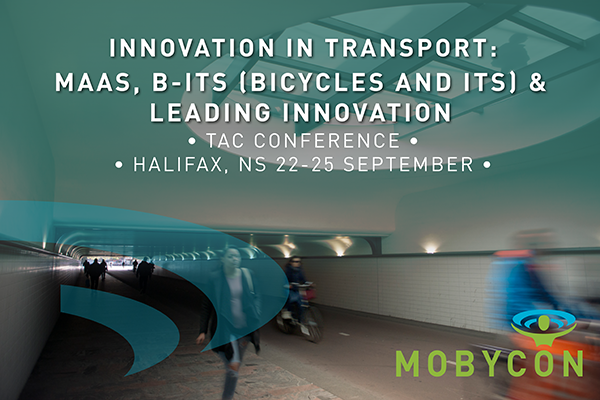Conference / Cycling / Cycling infrastructure / Infrastructure / Innovation / Innovative / ITS / Sustainability / Technology / Workshop
MaaS, B-ITS (Bicycles and ITS) & Leading Innovation: Mobycon at TAC 2019
From the 22 to 25 of September, Hélène van Heijningen and Justin Goulding will be in Halifax, Nova Scotia, Canada for the 2019 Transportation Association of Canada (TAC) Joint Conference & Exhibition. The event will highlight current industry challenges and opportunities through visionary sessions, panel discussions, workshops and keynote presentations delivered by esteemed peers and thought leaders from leading organizations. Hélène and Justine will also be presenting throughout the conference on innovations in cycling and transportation in the Netherlands and Canada.

 Public Transportation and New Mobility: B-ITS (Bicycles and ITS)
Public Transportation and New Mobility: B-ITS (Bicycles and ITS)
Presenter: Hélène van Heijningen; Transport and Mobility Advisor
Tuesday, 24 September; 9:30
Increasing cycling mode share is one of the best ways to combat negative impacts on cities and their residents. According to Fietsberaad (2010), a 10% increase in cycling relieves congestion by 11-15% and the European Cyclists’ Federation (ECF) released a report stating the total amount of CO2 emission per km per bike is 21gr compared to 271gr by the average car. It is clear that a modal shift from car to bicycle is better for everyone. Governments therefore are looking ways to encourage travellers to take up cycling.
ITS (Intelligent Transport Systems) improves the safety, reliability, speed, convenience, comfort and experience of cycling. With B-ITS (Bicycles and ITS), the idea is to close the data loop for cycling, making it available for cycling advocates, policy makers and other stakeholders (e.g. app developers or other businesses). Through applications for cyclists (e.g. interactive/smart traffic lights, nudging apps, smart routing and parking, tracking) cycling can become more attractive as a mode of transportation. At the same time, these applications generate valuable data like cycling and infrastructure utilization, which provides valuable input for creating effective cycling policy. Improved policies attract more cyclists, generating even more (floating) bike data, thus closing the loop.
B-ITS is a relatively new domain which encompasses all ITS systems and services in the cycling domain, to make it safer, more attractive, and more efficient. During the presentation, Hélène will elaborate on the concept of cycling and ITS and the innovations held within. Experiences from the BITS project so far will be shared and reflected on, with future steps explained.
Connected & Automated Vehicles: Leading Innovation Timeline (LIT) as an Enabler for Traffic Management Roadmaps
Presenter: Hélène van Heijningen; Transport and Mobility Advisor
Tuesday, 24 September; 16:45
Traffic management is changing fast. The future is ‘connected systems’ and ‘connected people’. In order to make the right choices concerning smart mobility, it is important for road operators to monitor ITS developments relevant for traffic management. Road operators are simultaneously shaping the future while monitoring the daily operation of traffic management for a long period. The combination of connected and not-connected, autonomous and not-autonomous vehicles, will lead to increased complexity in traffic. The risk exists that this will negatively influence safety and congestion, and so road operators have to prepare themselves for this. Flexibility means that road operators will have to take into account the possibility that some developments will go faster, others might be delayed, and new innovations will appear.
In this presentation, Hélène will examine Dutch road operator Rijkswaterstaat’s development of the Leading Innovation Timeline (LIT) to visualize innovations in IT systems that are likely to have an impact on traffic management. Thanks to the LIT, investments can be made in time and road operators will be better informed about the risks of new innovations.
 Public Transportation and New Mobility: Opportunities for MaaS and Cycling
Public Transportation and New Mobility: Opportunities for MaaS and Cycling
Presenter: Justin Goulding; Integrated Mobility Consultant
Monday, 23 September; 14:45
Increasingly, governments are exploring solutions to pressing urban problems like accessibility, environmental impact and lack of spatial capacity. Mobility as a Service (MaaS) offers opportunities to mitigate congestion, improve liveability and use data to match supply to demand in transportation. In the Netherlands, many municipalities are committed to further reducing auto-dependence and overall car use to help maintain high levels of accessibility, improve sustainability and make Dutch communities more liveable. For shorter distances (≤5km), the focus is mainly on promoting cycling, while for longer distances they look to the public transit-cycling combination for the first and/or last mile. As bike-share programs have increased the competitiveness of the cycling for both the first and last mile, the ‘capillaries’ of the spatial structure in cities become more accessible and the attractiveness of public transport also increases. Therefore, the bicycle deserves a special place within the MaaS concept.
In order to realise the opportunities brought by cycling with respect to MaaS, bike sharing systems should have appropriate (open) APIs in order to be included in MaaS applications. However, there are many more steps to be taken besides the inclusion of shared bicycles. For example, a multitude of cycle-related data should be opened up and included, starting with cycle routes and real-time information on the availability of bike parking spaces. The attractiveness of cycling can be further improved by adding ITS (Intelligent Transport System) solutions like providing weather information.
In his presentation, Justin will explore some of the challenges that have arisen in the Netherlands when incorporating the bicycle into MaaS. This includes the integration of the bicycle within the information services of MaaS applications, and the necessity for good organisation between public and private sectors for multimodal transport systems. These challenges presented to show how the lessons learn are applicable in a Canadian context.

